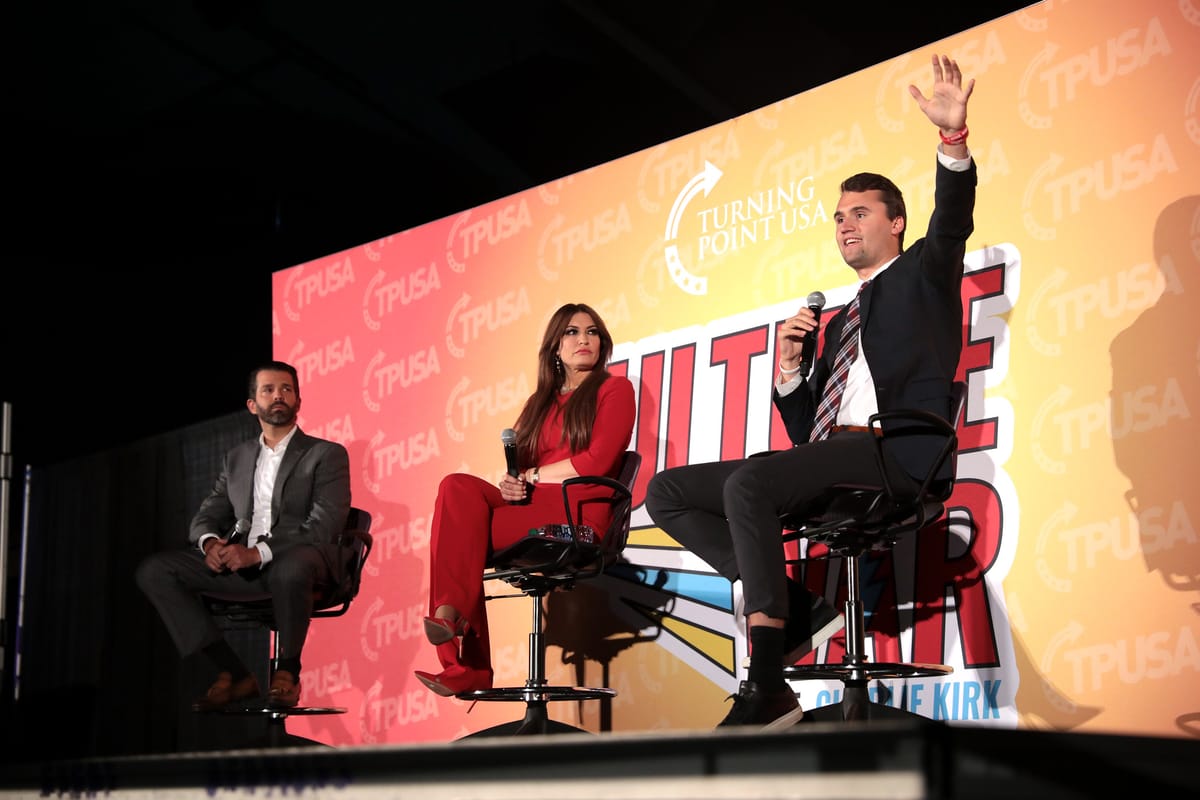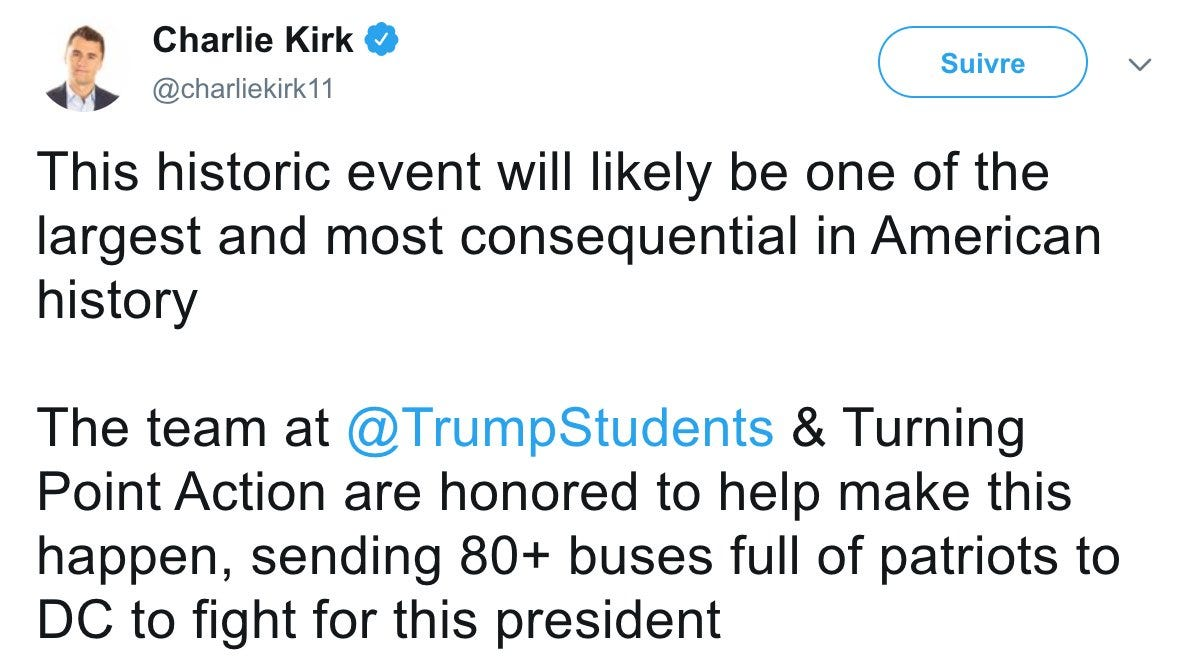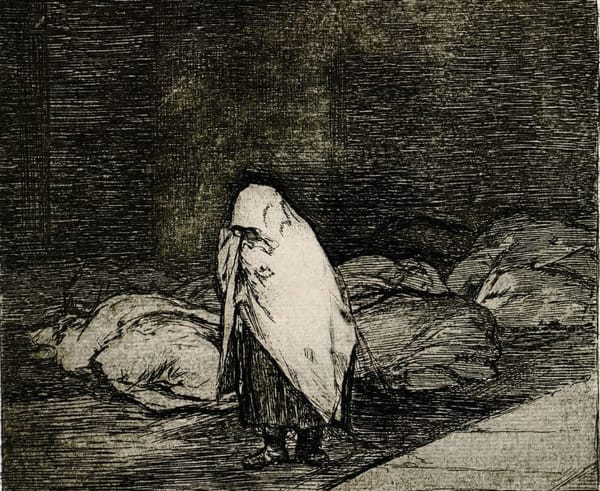Not All Victims Should Be Martyrs
Charlie Kirk believed in advancing right-wing political goals and attacking left-wing opponents by any and all means necessary—including political violence.

This is a response to Ezra Klein’s recent opinion piece in the New York Times titled "Charlie Kirk Was Practicing Politics the Right Way," wherein Klein laments the death of right-wing political figure Charlie Kirk, who was shot and killed while speaking on a Utah university campus this week. Kirk’s death is awful and a potential sign of worse to come. I agree with Klein that “political violence is a virus” and there is no virtue in celebrating his death or encouraging similar actions. However, Klein gets a good bit too misty-eyed in his portrayal of Kirk’s politics and legacy.
Klein opens by listing some violent political attacks in our recent history: from the plotted kidnapping of Governor Gretchen Whitmer to the January 6th insurrection to the murder of Minnesota House Speaker Melissa Hortman and her husband this past summer. He then writes about how he believes that Kirk represented an example of politics done "the right way," as opposed to the wrong way of violence.
You can dislike much of what Kirk believed and the following statement is still true: Kirk was practicing politics in exactly the right way. He was showing up to campuses and talking with anyone who would talk to him. He was one of the era’s most effective practitioners of persuasion.
I did not know Kirk and I am not the right person to eulogize him. But I envied what he built. A taste for disagreement is a virtue in a democracy. Liberalism could use more of his moxie and fearlessness.
I do not think this is an accurate portrayal of who Kirk was and how he practiced politics. I don’t know if Klein is simply unaware of Kirk’s history in politics—he does say he didn’t know the man—or if he’s purposefully choosing to ignore some very important pieces of information. Two of the violent incidents cited by Klein as examples of a troubling pattern in recent American politics are the home invasion of former Democratic Speaker Nancy Pelosi and the January 6 insurrection. These are both key examples of how Kirk did not engage with politics in “exactly the right way” and why he should not be portrayed as such.
On October 28, 2022, David DePape broke into former Democratic Speaker Nancy Pelosi’s home in San Francisco. She was not home at the time but her husband Paul Pelosi was beaten by the invader with a hammer severely enough to leave him with a fractured skull. DePape had a long history of mental health issues, drug abuse, and a fascination with right-wing conspiracy theories, including QAnon and Donald Trump’s false claims that the 2020 election was stolen. Following this attack, many conservative commentators and officials began spinning absurd claims that the attacker was secretly Paul Pelosi’s scorned gay lover or a hired prostitute instead of the right-wing nutjob he was. In the above video, Kirk trafficks in these very same absurd claims and encourages his audience to bail the suspect out of jail.
Why is the conservative movement to blame for gay schizophrenic nudists who are hemp jewelry makers breaking into somebody’s home—or maybe not breaking into somebody’s home?
Why is he still in jail, why has he not been bailed out? By the way if some amazing patriot out there in San Francisco or the Bay Area wants to really be a midterm hero, someone should go and bail this guy out.
This is not a politics of persuasion or healthy debate. This is not a man equally committed to both civility and his political beliefs.
My problem with eulogizing Kirk is not that I disagree with his politics, but that the eulogies are wrong on the underlying substance: Kirk was not an example of healthy political discourse, and we should not pretend otherwise just because he was the victim of what appears to be more senseless political violence.
Kirk not only advocated for bailing the perpetrators of right-wing political violence out of jail, but he personally helped to facilitate one of the worst attacks on our nation’s democracy in history. Following Trump’s defeat in the 2020 election, Kirk was a prominent voice in promoting the false theory that the election had been rigged or stolen. Kirk was such a big proponent of the misinformation that even Fox News’ Geraldo Rivera got into a televised spat with him on the subject. Over the course of the winter of 2020, Trump, Kirk, and others in right-wing media fanned the flames of these false theories until the day that Congress certified the results of the election on January 6.
On that day Donald Trump directed a mob of his supporters to march on the Capitol building to “stop the steal” by preventing the certification of his electoral loss. Thousands of angry Trump supporters descended on Congress, overrunning many police barricades and breaking into the building. Legislators and the Vice President were hastily evacuated, and for the first time in American history the certification of a Presidential election was delayed by violence encouraged by the losing candidate.
On January 5, Kirk had tweeted that he was “honored to help make this happen.”

(The tweet was later deleted but can be seen in archives such as the Wayback Machine.)
Following the attack, Kirk stated that many of those taking part in the invasion of the Capitol were not insurrectionists. He was called before the House Select Committee for his involvement in organizing the rally and pled his Fifth Amendment right against self-incrimination. Congressional transcripts show that Publix heiress Julie Fancelli paid Kirk’s organization $1.25 million to fund buses that transported people to DC on January 6. Fancelli wrote to her personal assistant “I need you to send $250,000 to Charlie Kirk ASAP … It is for busing in more people.”
And after the insurrection, Kirk only doubled down, even praising the President for pardoning the January 6 insurrectionists, describing them as “hostages” being saved from “lawfare tyranny.”
I challenge Ezra Klein and anybody else to tell me that these are examples of doing politics "right." Others have already responded to Klein’s piece by listing some of Kirk’s many repugnant political positions and statements, though that is not my critique here. Klein himself says that he and Kirk “were on different sides of most political arguments.” I would certainly hope that Klein takes the other side of the argument when it comes to repealing the Civil Rights Act, or denying that Black women have enough brain processing power to be taken seriously, or holding that doctors who perform gender-affirming care should get Nuremberg trials. My problem here is the whitewashing of Kirk’s political career as a sort of Lincoln-Douglas debate disciple, as a man of peace who simply talked to those he disagreed with. Kirk and many other Republicans have been enabling, endorsing, or outright facilitating political violence against their opponents for years.
It is bad that Charlie Kirk was shot and killed. That does not make him a good man. You don’t have to make him into a martyr just because he was a victim. Painting Kirk as a role model for political discourse requires either a staggering ignorance or intentional neglect of what he actually stood for. I do not “envy what he built” as Klein puts it.
I come back to that line about Klein and Kirk being on different sides of political arguments: “Kirk and I were on different sides of most political arguments. We were on the same side on the continued possibility of American politics.” No, you weren’t. Kirk was not on the side of the continued possibility of American politics. He was on the side of advancing right-wing political goals and attacking his left-wing opponents by any and all means necessary.
Let me be extraordinarily clear that Kirk’s reprehensible politics do not in any way justify or legitimize his death. I agree with Klein that political violence is contagious and corrosive to our society. That’s why it is bad that many Republicans continue to tacitly or explicitly endorse violent attacks against their political opponents, as Kirk himself did.
Featured image is Donald Trump, Jr., Kimberly Guilfoyle & Charlie Kirk, by Gage Skidmore




